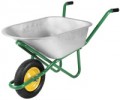Wheel diameter
The diameter of the wheel(s) of a wheelbarrow or trolley (see "Type"). Permeability primarily depends on this parameter: the larger the wheel, the less sensitive it is to pits and irregularities, and the easier it is to carry the entire structure over rough terrain. At the same time, in carts (including ladders, see "Type"), the diameter of the wheels is relatively small — it rarely exceeds 250 mm. But for wheelbarrows 200 – 250 mm is considered a very limited indicator — most models use wheels with a diameter of 300 to 400 mm.
Load capacity
Wheelbarrow / trolley capacity — the maximum weight of the load that can be constantly carried on it.
In this case, a load capacity
of up to 150 kg is considered small; wheelbarrows in this category are intended mainly for gardening, and carts for relatively small loads like a sack of potatoes or a couple of sacks of cement. Models for
150 – 200 kg can be attributed to the middle category, among them it already makes sense to look for cars for construction work of a relatively small volume. And in the most durable and "hardy" products, this figure can
exceed 200 kg, reaching 500 kg or even more.
It is worth noting that most modern wheelbarrows / carts (especially at the beginning of operation) can easily carry short-term loads that exceed the claimed carrying capacity without visible consequences. However, overloading the structure is highly discouraged: in such cases, it will experience off-design stress, which reduces the overall service life and increases the risk of failure at the most inopportune moment.
Weight
Total weight of an empty wheelbarrow/cart in standard working configuration (if equipped with detachable support legs — with legs installed, see above). This parameter allows you to estimate how much excess weight you will have to carry with you in addition to the actual cargo. However it doesn't always make sense to chase light weight — it can mean less strength.

